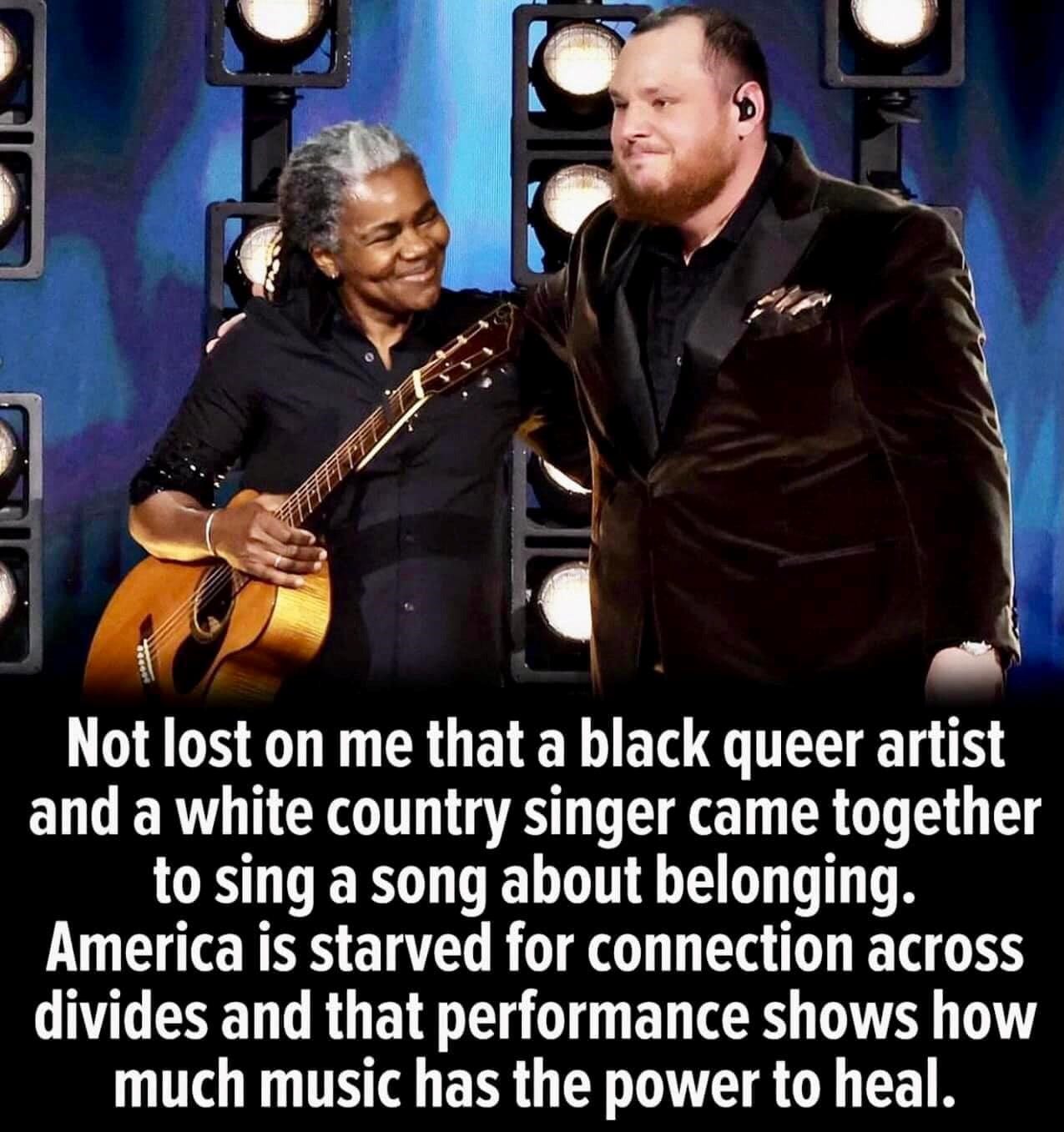The Beauty and Tragedy of "Fast Car" at the Grammys
In many ways, the struggle is shared - but what we should do about it is not.
The duet between Tracy Chapman and Luke Combs has already gone down in Grammys history. It was a poignant moment on many levels: Chapman has been out of the public eye for years, and Combs’s cover of her 1988 hit “Fast Car” has brought it, and her, to a new audience. It felt redemptive, and as someone who was a teenager when “Fast Car” became an improbable hit back then, I was moved just to see this important, prescient, beautiful slice of Americana gain such well-deserved attention. Plus they sang it beautifully.
For many of us, the moment is also poignant because this is 2024, and seeing a Black queer woman and a straight white male country singer do anything together gives us a glimpse of hope – let along sing a song about marginalization, homelessness, and the shared yearning for a better life. Here’s one of the memes that’s gone around lately:

Well… yes, but.
Yes, “Fast Car” beautifully shows how the struggles of different people are similar. But not only is there disagreement about what to do about them, the Republicans which many of Combs’s fans support have been cynically exploiting this pain for decades, all the while making matters worse.
To be sure, Combs’s cover did do something profound: it helped us see how Chapman’s poetry speaks to the pain felt by all kinds of people — including those of the predominantly white, predominantly conservative country music audience. (I don’t mean to over-generalize here – in fact, while around sixty percent of country music fans say they’re Republican, many aren’t, and the condescension that coastal elites have for everyone else is itself part of what I want to talk about.) While Chapman’s song is notably race-neutral, her identity and personal story led most of us, rightly or wrongly, to project her identity onto the protagonist of the song. “Fast Car” was widely interpreted as being about a Black experience of poverty and struggle, and as such, hearing it on the radio in 1988 was a powerful socio-political moment.
And yet, Combs’ version fits too. It’s easy to imagine the protagonist as a white person in a rural setting whose family may be struggling with opioid addiction, or America’s loss of sustainable blue-collar jobs, or stigma and marginalization. Combs doesn’t say any of this explicitly, of course (and while some have predictably complained about appropriation, in fact he has been consistently respectful and credit-giving to Chapman, up to and including that Grammys performance), but this is what good covers always do: they recontextualize the material, allowing us to see it in a new way.
But here’s the thing. While liberals often dismiss the “white working class” as a bunch of uneducated racists, thus ignoring the real challenges they face, Republicans often exploit their grievances while actually making matters much worse.
What, after all, is the alchemy of Republicanism, from Nixon to Reagan to Trump? First, play Combs’s version of “Fast Car” to generate sympathy. Second, blame the situation on immigrants, elites, Democrats, Socialism, Critical Race Theory, Wokeism, affirmative action, big government, or whatever. Third, make economic conditions even worse for working people while bamboozling them with Step Two.
This sleight-of-hand has worked since Ronald Reagan first convinced working-class whites that (racially-coded) “welfare” was the problem and that tax cuts for the rich would “trickle down” to everyone else (which they did not). It’s “what’s the matter with Kansas,” to cite one much-maligned work: voting social policy over economics. But Trump has raised it to a dark art form.
Keep reading with a 7-day free trial
Subscribe to Both/And with Jay Michaelson to keep reading this post and get 7 days of free access to the full post archives.




